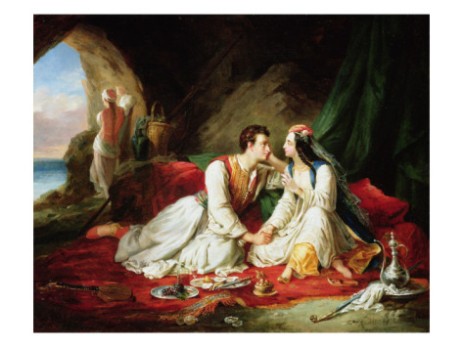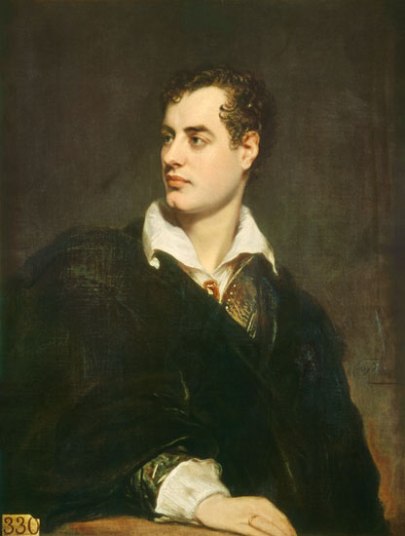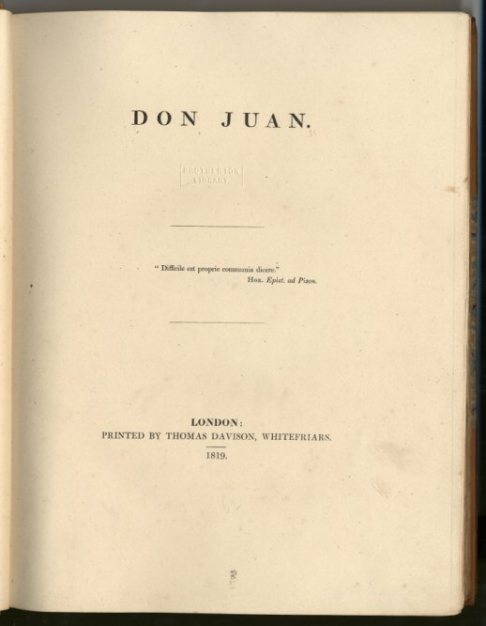Given Charles Clark’s love of comic poetry, satire, and controversy, we should not be surprised to find that Byron was one of his favourite writers.
While Clark considered Thomas Hood and John Clare his literary heroes, his frequent quotations from Byron’s poetry and letters indicate an easy familiarity with the author of Childe Harold’s Pilgrimage and Don Juan. Don Juan was certainly one of Clark’s preferred works; he makes countless references to Byron’s masterpiece throughout his correspondence with John Russell Smith.
Clark owned a copy of Thomas Medwin’s controversial Conversations with Lord Byron, and several other Byron-related works – he was especially interested in supposed ‘suppressed stanzas’ from Don Juan.
When Byron sent the manuscript of Don Juan to John Murray, the publisher showed it to the poet’s friends who thought the poem was far too scandalous to publish. John Cam Hobhouse sent Byron a letter acknowledging the genius of the work but outlining the reasons why it should never see the light of day, including references to Byron’s wife as well as several living poets, the frank eroticism, and the ‘immoral turn’ of the opening cantos. John Murray decided to publish the poem in an expensive quarto edition; it was agreed that Byron’s name should not appear on the title page. When the poem was finally published it had neither author nor publisher’s name, several pages were left blank, and stanzas were suppressed by being printed as rows of asterisks.
Contemporary reviewers seized on the absence of the publisher’s name in order to categorise Don Juan as a monstrous birth. The British Critic talked of a poem ‘spawned in filth and darkness’:
A thousand low and portentous murmurs preceded his birth…it was stated to be of a complexion so blasphemous, as even in these days of liberality, to endanger the personal security of the bookseller…Paternoster-row was paralysed…Fearful indeed was the prodigy – a book without a bookseller: an advertisement without an advertiser – a “deed without a name.” After all this portentous parturition, out creeps DON JUAN.
Of course, the reaction, and the supposed immorality of the poem were utterly exaggerated – fuelled by disapproval of Byron himself. Eventually, Byron’s ten year association with John Murray broke down and he transferred publication of the later cantos to the radical publisher John Hunt. A first edition of Don Juan would contain the first five cantos published by Murray, and the remaining eleven by John Hunt (Byron died in Greece in 1824, leaving the poem unfinished). Charles Clark owned such an edition, bought for over two pounds, and sold to John Russell Smith as ‘a scarce edition’, on 29 May 1838.
By publishing the poem anonymously and without his name, John Murray facilitated wholesale piracy, not to mention countless imitations and spin-off titles. Clark owned several of these, including the bizarrely titled Don Juan Junior: A Poem by Byron’s Ghost by G.R.W. Baxter. In 1838 Clark tried to contact Frederick William Naylor Bayley regarding supposed rejected stanzas of Don Juan. Bayley wrote miscellaneous verse and was the first editor of the Illustrated London News. On 29 May 1838 Clark wrote to Smith:
What a strange being that “F.W.N. Bayley, Esq.” must be! By-the-bye, I have written to him (thro’ his publisher) no less than four times respecting those suppressed stanzas of “Don Juan” which I once troubled you about; offering him no less than three guineas for a transcript only of them, promising never to publish them; and though I am quite sure all my letters duly reached him, he has, as yet, never taken the least notice of any of them! – is he not a polite gentleman? In a late No. of the Torch, he stated that he possesses 150 of these stanzas, all curiously written in double rhyme, but my opinion now is, that he has no such a number.
We do not know whether Clark finally managed to make contact with Bayley, but it is certain that he acquired a copy of the stanzas. In 1845 he printed and circulated ‘Some Rejected Stanzas of Don Juan’. The publication was evidently popular as it appears in several lists of books that Clark sent to Smith, and Smith appears to have asked Clark for copies on numerous occasions. Although he feared it was inappropriate for female readers, Clark delighted in Byron’s Don Juan, especially a stanza from Canto Seven which he liked to send to his friend John Russell Smith of Old Compton Street:
One of the valorous ‘Smiths’ whom we shall miss
Out of those nineteen who late rhymed to ‘pith;’
But ‘t is a name so spread o’er ‘Sir’ and ‘Madam,’
That one would think the first who bore it ‘Adam.’


